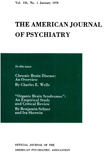THE PERSONAL PROBLEMS OF SENIOR NURSING STUDENTS
Abstract
The present paper follows a previous study which analyzed 735 love and marital and 601 sexual questions of over 2,000 nursing students. In the present paper, 572 non-marital and nonsexual questions of these students, as anonymously asked of a psychiatrist, are categorized and analyzed. It was found that 68% of these 572 questions seemed to be concerned (directly or indirectly) with the subjects' personal problems; while 32% were of a more objective character. It was also found that the girls, on the whole, seemed to have a considerable number of (sexual and nonsexual) problems; but that these tended to be about relatively mild rather than severe emotional disturbances. It was noted, finally, that the types of questions often asked by the senior student nurses tended to show that their knowledge of basic mental hygiene principles was surprisingly inadequate; and it was recommended that nursing schools might well give considerably more attention to the study of mental hygiene in their regular nursing education curricula.
Access content
To read the fulltext, please use one of the options below to sign in or purchase access.- Personal login
- Institutional Login
- Sign in via OpenAthens
- Register for access
-
Please login/register if you wish to pair your device and check access availability.
Not a subscriber?
PsychiatryOnline subscription options offer access to the DSM-5 library, books, journals, CME, and patient resources. This all-in-one virtual library provides psychiatrists and mental health professionals with key resources for diagnosis, treatment, research, and professional development.
Need more help? PsychiatryOnline Customer Service may be reached by emailing [email protected] or by calling 800-368-5777 (in the U.S.) or 703-907-7322 (outside the U.S.).



